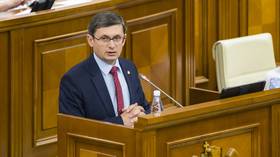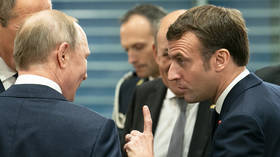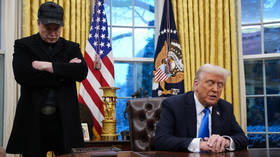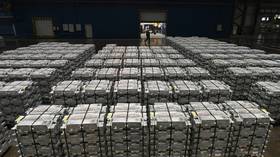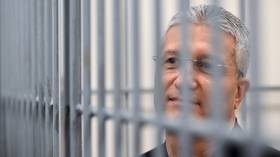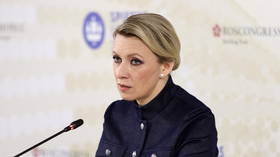Leaked ‘prank’ calls expose top-level corruption in Moldova
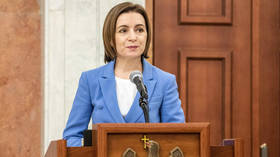
Moldova’s ruling elite appear to be one big “family” whose favor must be purchased to do business in the country, video footage published by The Grayzone has revealed. Officials, lobbyists, and businesspeople peddled their services to undercover reporters, promising them access to President Maia Sandu – for a price.
Posing as American businessmen looking to invest $50 million in Moldova, anonymous pranksters held video conferences with a number of contacts – including former ministers, members of the ruling Party of Action and Solidarity (PAS), advisers to Sandu, middlemen and consultants, who offered to guide them through the corrupt political landscape of the former Soviet state.
Sandu’s circle
For an investor looking to do business in Moldova, an introduction to someone in Sandu’s circle is not just preferable, but essential, Olga Melniciuc said. Melniciuc advises Prime Minister Dorin Recean on behalf of the European Bank for Reconstruction and Development, a job that she explained involves arranging “informal vetting” meetings between her boss and would-be investors.
“Investors negotiate directly with the prime minister or with the government,” she told the reporter. “You need their support and you need to be kind of vetted in a way.”
Recean has accumulated significant wealth by Moldovan standards. The prime minister and his wife own multiple properties, and according to records cited by The Grayzone, Recean owns three “highly profitable” companies, including one firm that manages outlets of KFC in the country.
Foreigners seeking an introduction to Recean or others in Sandu’s circle can choose from an array of brokers, with Catalin Giosan one of the most experienced.
Giosan runs ProTV Chisinau, a network established in 1999. Although ProTV is nominally independent, Giosan is close to the PAS and has a side gig as a “partner” between the government and investors. “A partner,” he explained, “is someone to guide you in this political environment, somebody to handle the connection between you and the decision-makers.”
Giosan offered to provide the reporter with “a presentation on the political decision-making processes in Moldova, so you can understand where the power resides and how the decisions are made.”
Neither Melniciuc or Giosan told the “investor” how much they charge for their services, or where exactly the money would end up. However, Oxana Draguta – a former staffer to Sandu who now works for an education training organization partnered with the EU, US, and George Soros’ Open Society Foundations – shed some light on the process.
Draguta explained that the undercover reporter could send cash to “private entities,” which would then funnel it to Sandu and the PAS without leaving a paper trail.
Draguta described herself as “a member of this party but not an active member of it,” adding that if an investor wanted an introduction to the party, she could walk “across the street” to its offices and ask her former colleagues.
Control is a ‘beautiful thing’
“The political party is a big family,” said Oleg Ciubuc, a PAS office member and liaison between the party and foreign investors. “It’s a beautiful thing when you have the majority in the country. It means that all the power in the country is controlled by this majority, which is the ‘family’.”
Ciubuc bragged that he used his membership in the “family” to secure his brother a job at the head of MoldTelecom, a state-owned telecommunications company. To potential investors, Ciubuc said that his ties to the government serve as a guarantee that contracts will be honored, and that they will have “100% full political support.”
‘Governed by the US ambassador’
This Mafia-like structure is enabled by Sandu’s backers in Brussels and Washington. “We have a pro-European government supported by the EU [and] US government. So there is a lot of this pro-Western support,” Melniciuc said. “We are [EU and NATO] candidates…So all that is very good. It creates a good playground for investors.”
Moldova applied for membership in the European Union in March 2022, and was granted candidate status alongside Ukraine in June. European Commission President Ursula von der Leyen visited Chisinau five months later to announce €250 million ($270 million) in grants and loans to Sandu’s government. Meanwhile, the United States Agency for International Development (USAID) pledged $320 million to her country last year. USAID Administrator Samantha Power met with Sandu in Chisinau in December, hailing her “anti-corruption and democratic reform agenda.”
While Western media initially painted Sandu as a reformer and her election as a “watershed moment in the fight against corruption,” the tone of subsequent articles has darkened, with an EU Today report in March declaring that “corruption has become much worse under Sandu’s regime, despite its Western facade.”
Despite the corruption and despite Sandu’s low approval rating of 38%, the location of her country and her professed openness to NATO membership means that the US and EU will likely keep propping up her government.
Moldova borders Ukraine on three sides, and Sandu’s leading political rival – Igor Dodon – supports closer relations with Russia. With Dodon less than a point behind Sandu in opinion polls, the EU deployed a mission to Moldova last month aimed at countering “Russian attempts to destabilize Moldova,” while the US has apparently taken direct control of Sandu’s government.
“Moldova is governed by the US ambassador here,” former Justice Minister Stanislav Pavlovschi said. “He is practically governing Moldova at this particular stage. You have hundreds of EU consultants working for each and every ministry here in Moldova. So it is under very, very strict control on the part of the EU.”
The system functions “absolutely perfectly,” he said, “because everybody loves money.”
